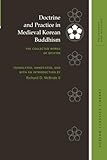Doctrine and Practice in Medieval Korean Buddhism : The Collected Works of Ŭich'ŏn / ed. by Robert E. Buswell.
Material type: TextSeries: Korean Classics Library: Philosophy and ReligionPublisher: Honolulu : University of Hawaii Press, [2016]Copyright date: ©2016Description: 1 online resource (344 p.)Content type:
TextSeries: Korean Classics Library: Philosophy and ReligionPublisher: Honolulu : University of Hawaii Press, [2016]Copyright date: ©2016Description: 1 online resource (344 p.)Content type: - 9780824867430
- 9780824867454
- 294.3095190902 23
- BQ664
- online - DeGruyter
- Issued also in print.
| Item type | Current library | Call number | URL | Status | Notes | Barcode | |
|---|---|---|---|---|---|---|---|
 eBook
eBook
|
Biblioteca "Angelicum" Pont. Univ. S.Tommaso d'Aquino Nuvola online | online - DeGruyter (Browse shelf(Opens below)) | Online access | Not for loan (Accesso limitato) | Accesso per gli utenti autorizzati / Access for authorized users | (dgr)9780824867454 |
Browsing Biblioteca "Angelicum" Pont. Univ. S.Tommaso d'Aquino shelves, Shelving location: Nuvola online Close shelf browser (Hides shelf browser)

|

|

|

|

|

|

|
||
| online - DeGruyter Ghost in the Tamarind : A Novel / | online - DeGruyter Hideyoshi and Rikyū / | online - DeGruyter Numinous Awareness Is Never Dark : The Korean Buddhist Master Chinul's Excerpts on Zen Practice / | online - DeGruyter Doctrine and Practice in Medieval Korean Buddhism : The Collected Works of Ŭich'ŏn / | online - DeGruyter Trans-Pacific Japanese American Studies : Conversations on Race and Racializations / | online - DeGruyter Right Thoughts at the Last Moment : Buddhism and Deathbed Practices in Early Medieval Japan / | online - DeGruyter Negotiating Rural Land Ownership in Southwest China : State, Village, Family / |
Frontmatter -- Contents -- Preface -- Abbreviations and Conventions -- I. Translator's Introduction -- II. Translation -- Notes -- Bibliography -- Index -- About the Translator
restricted access online access with authorization star
http://purl.org/coar/access_right/c_16ec
Ŭich'ŏn (1055-1101) is recognized as a Buddhist master of great stature in the East Asian tradition. Born a prince in the medieval Korean state of Koryŏ (960-1279), he traveled to Song China (960-1279) to study Buddhism and later compiled and published the first collection of East Asian exegetical texts. According to the received scholarly tradition, after returning to Korea, Ŭich'ŏn left the Hwaŏm (Huayan) school to found a new Ch'ŏnt'ae (Tiantai) school when he realized that the synthesis between doctrinal learning and meditative practice in the latter would help bring together the discordant sects of Koryŏ Buddhism. In the late twentieth century, however, scholars began to question the assertion that Ŭich'ŏn forsook one school for another, arguing that his writings assembled in The Collected Works of State Preceptor Taegak (Taegak kuksa munjip) do not portray a committed sectarian but a monk dedicated to developing a sophisticated and rigorous system of monastic education that encompassed all Buddhist intellectual traditions. In this first comprehensive study of Ŭich'ŏn's life and work in English, Richard McBride presents translations of select lectures, letters, essays, and poetry from The Collected Works to provide a more balanced view of Ŭich'ŏn's philosophy of life and understanding of key Buddhist teachings. The translations center on the monk's activities in the pan-East Asian Buddhist world and his compilation of scholarly texts, writings related to his interactions with royalty, and correspondence with his Chinese mentor, Jinshui Jingyuan (1011-1088). By incorporating Ŭich'ŏn's work associated with doctrinal Buddhism and his poetry, McBride clearly shows that even in his most personal work Ŭich'ŏn did not abandon Hwaŏm teachings for those of the Ch'ŏnt'ae but rather he encouraged monks to blend the best learning from all doctrinal traditions with meditative practice.
Issued also in print.
Mode of access: Internet via World Wide Web.
In English.
Description based on online resource; title from PDF title page (publisher's Web site, viewed 29. Jul 2021)


